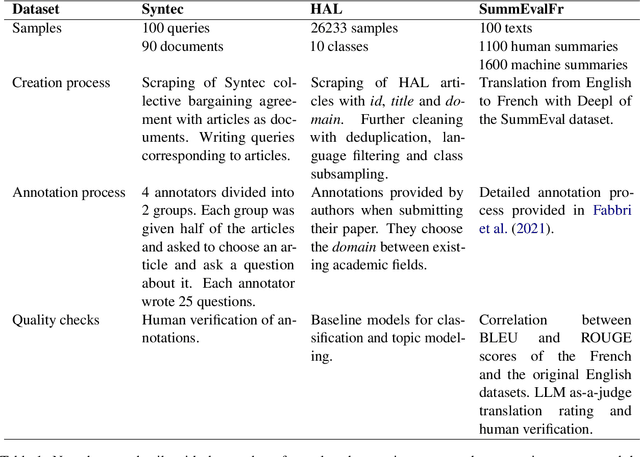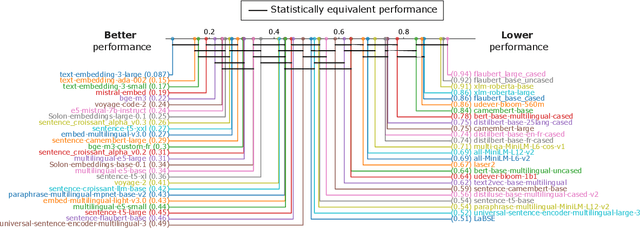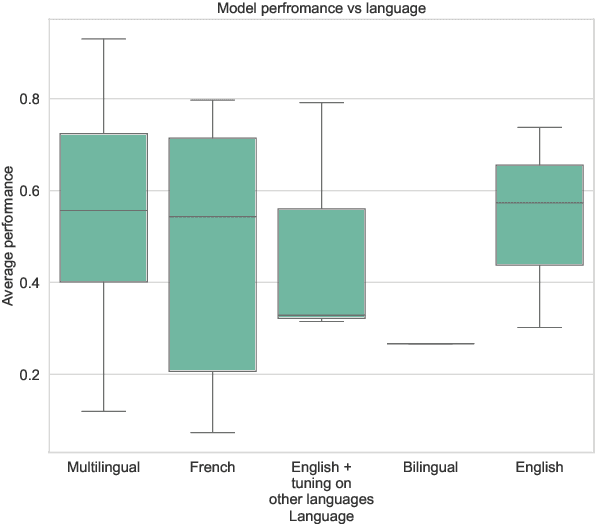Imene Kerboua
MIEB: Massive Image Embedding Benchmark
Apr 14, 2025Abstract:Image representations are often evaluated through disjointed, task-specific protocols, leading to a fragmented understanding of model capabilities. For instance, it is unclear whether an image embedding model adept at clustering images is equally good at retrieving relevant images given a piece of text. We introduce the Massive Image Embedding Benchmark (MIEB) to evaluate the performance of image and image-text embedding models across the broadest spectrum to date. MIEB spans 38 languages across 130 individual tasks, which we group into 8 high-level categories. We benchmark 50 models across our benchmark, finding that no single method dominates across all task categories. We reveal hidden capabilities in advanced vision models such as their accurate visual representation of texts, and their yet limited capabilities in interleaved encodings and matching images and texts in the presence of confounders. We also show that the performance of vision encoders on MIEB correlates highly with their performance when used in multimodal large language models. Our code, dataset, and leaderboard are publicly available at https://github.com/embeddings-benchmark/mteb.
MMTEB: Massive Multilingual Text Embedding Benchmark
Feb 19, 2025Abstract:Text embeddings are typically evaluated on a limited set of tasks, which are constrained by language, domain, and task diversity. To address these limitations and provide a more comprehensive evaluation, we introduce the Massive Multilingual Text Embedding Benchmark (MMTEB) - a large-scale, community-driven expansion of MTEB, covering over 500 quality-controlled evaluation tasks across 250+ languages. MMTEB includes a diverse set of challenging, novel tasks such as instruction following, long-document retrieval, and code retrieval, representing the largest multilingual collection of evaluation tasks for embedding models to date. Using this collection, we develop several highly multilingual benchmarks, which we use to evaluate a representative set of models. We find that while large language models (LLMs) with billions of parameters can achieve state-of-the-art performance on certain language subsets and task categories, the best-performing publicly available model is multilingual-e5-large-instruct with only 560 million parameters. To facilitate accessibility and reduce computational cost, we introduce a novel downsampling method based on inter-task correlation, ensuring a diverse selection while preserving relative model rankings. Furthermore, we optimize tasks such as retrieval by sampling hard negatives, creating smaller but effective splits. These optimizations allow us to introduce benchmarks that drastically reduce computational demands. For instance, our newly introduced zero-shot English benchmark maintains a ranking order similar to the full-scale version but at a fraction of the computational cost.
Extending the Massive Text Embedding Benchmark to French
May 30, 2024



Abstract:In recent years, numerous embedding models have been made available and widely used for various NLP tasks. Choosing a model that performs well for several tasks in English has been largely simplified by the Massive Text Embedding Benchmark (MTEB), but extensions to other languages remain challenging. This is why we expand MTEB to propose the first massive benchmark of sentence embeddings for French. Not only we gather 22 existing datasets in an easy-to-use interface, but we also create three new French datasets for a global evaluation over 8 different tasks. We perform a large scale comparison with 46 carefully selected embedding models, conduct comprehensive statistical tests, and analyze the correlation between model performance and many of their characteristics. We find out that even if no model is the best on all tasks, large multilingual models pre-trained on sentence similarity perform particularly well. Our work comes with open-source code, new datasets and a public leaderboard.
 Add to Chrome
Add to Chrome Add to Firefox
Add to Firefox Add to Edge
Add to Edge